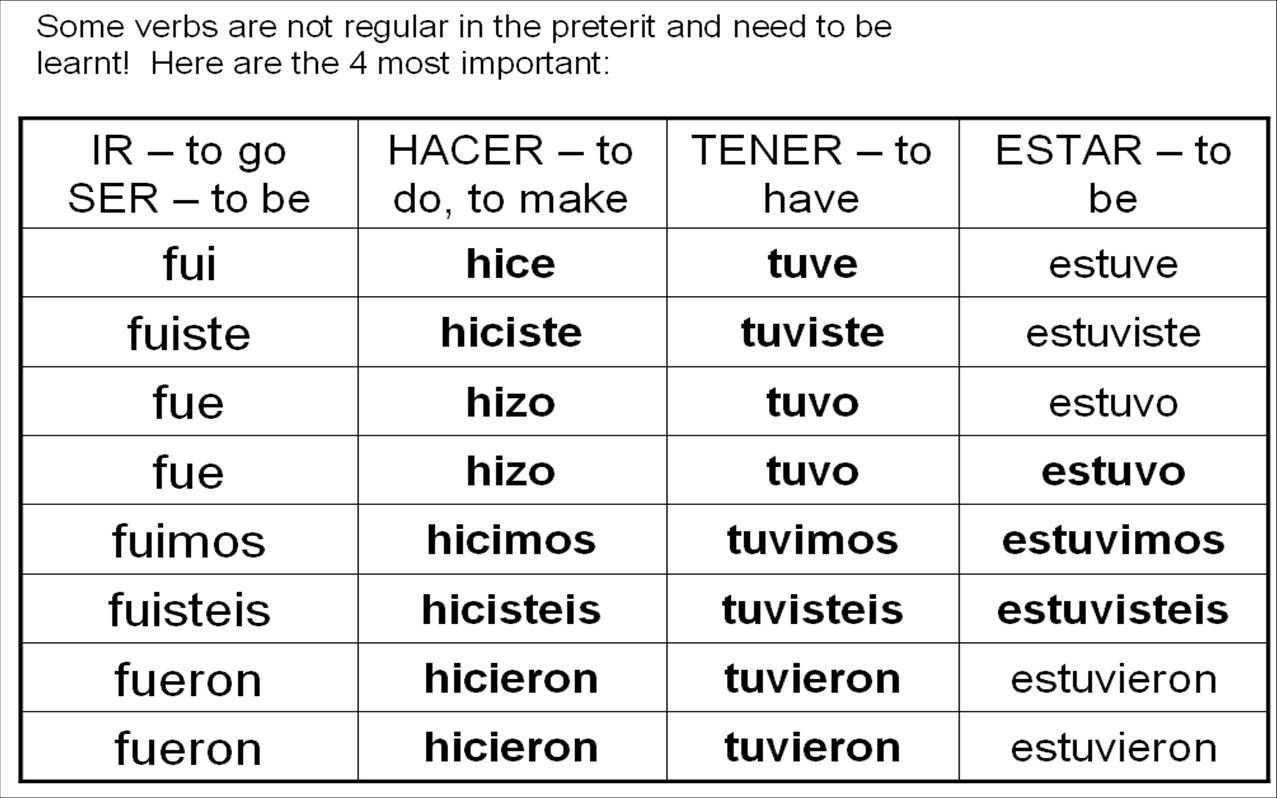
Ir Preterite Tense Conjugation Chart
In Spanish, the verb "poder" is a versatile verb that translates to "to be able to" or "can" in English. Mastering its conjugation in the present tense will provide a solid foundation for using this verb effectively. Let's explore the present tense conjugation of "poder": Yo puedo - I can; Tú puedes - You can (informal.
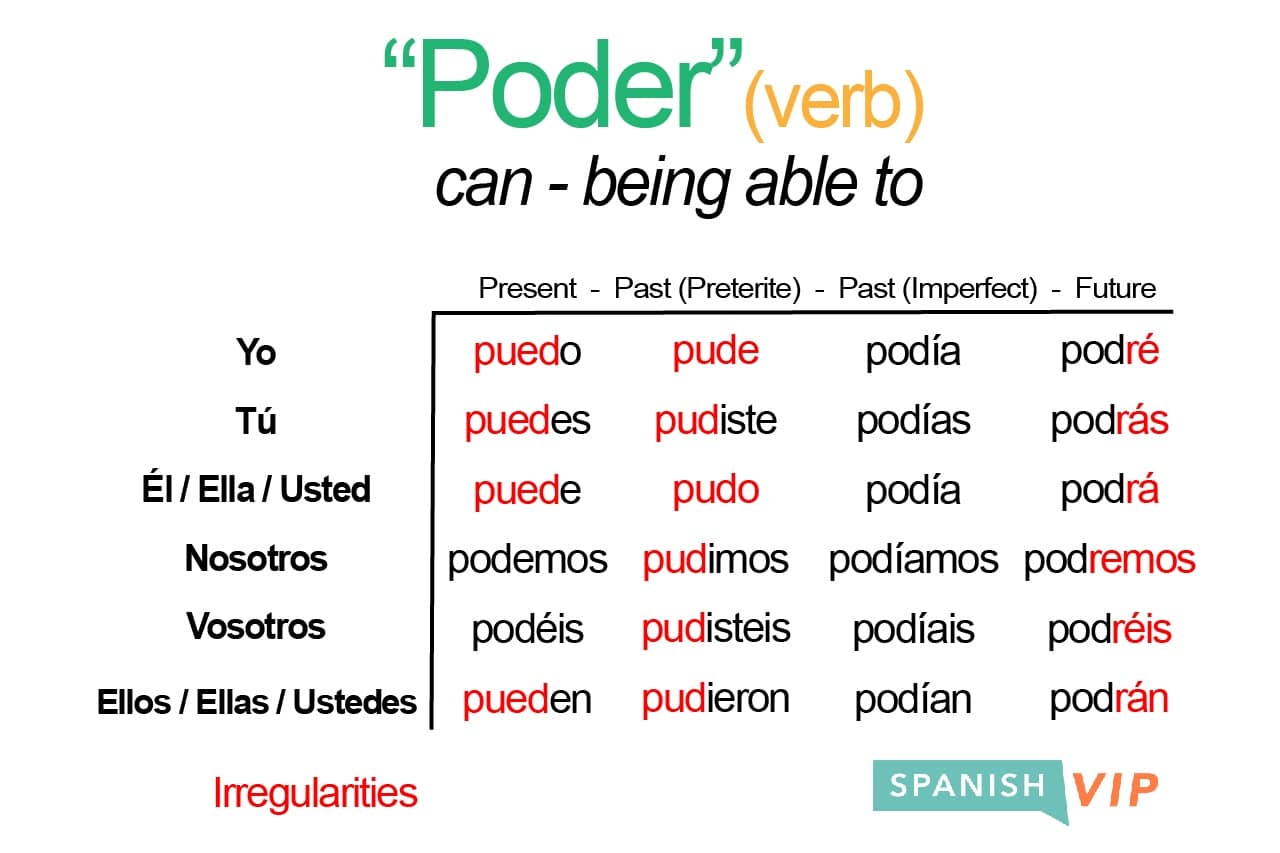
Poder Conjugation Master The Verb can In Spanish With Confidence
Conjugate the verb poder in all tenses: present, past, participle, present perfect, gerund, etc. Conjugation of poder - Spanish verb | PONS English

Audio + Video conjugation = Pouvoir = Indicatif Présent YouTube
Poder is the Spanish verb meaning "to be able to / to can". This verb can be used to ask for permission, e.g. ¿Podría usar el baño?, or to to express tolerance for something "No puedo más", meaning "I can't do any more". In it's purist form, it is used to express capability to do something.
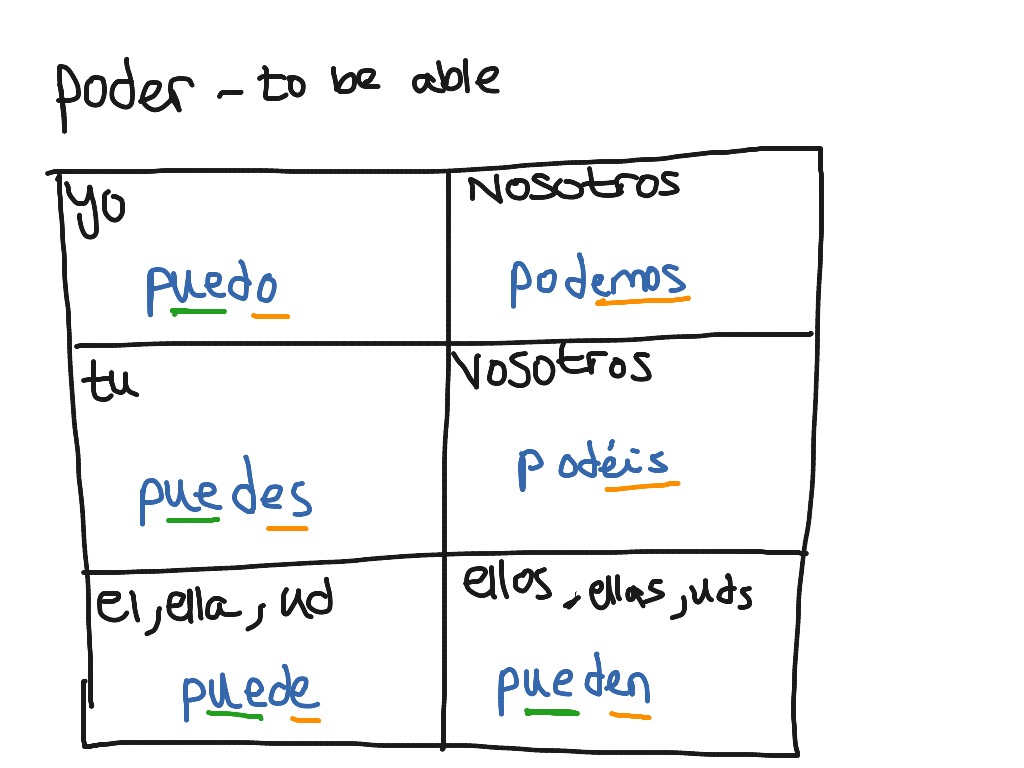
Poder spanish conjugation, spanish 1 ShowMe
In the present tense, the conjugation of "poder" is as follows: Yo puedo. (I can) Tú puedes. (You can) Él/Ella puede. (He/she can) Nosotros podemos. (We can) Vosotros podéis. (You all can) Ellos/Ellas pueden. (They can) In other tenses and moods, the conjugation of "poder" changes slightly.

Poder conjugations Diagram Quizlet
The conjugation of poder in the present tense is: Yo puedo (I can, am able), tú puedes (you can, are able), él/ella/usted puede (he/she can, is able; you can, are able), nosotros podemos (we can, are able), vosotros podéis (you can, are able) and ellos/ellas/ustedes pueden (they/you can, are able). Poder is an irregular ER verb.

Stemchanging verbs Jugar & Poder YouTube
The table below shows three common conjugations for the verb poder: the infinitive, the gerund, and the past particle. Here are three example sentences that use the conjugations of poder from the table above: Infinitive: Es importante poder entender otros idiomas. ( It is important to be able to understand other languages.)

Poder Conjugation How to Conjugate Poder in Spanish
poder to be able, "can" Preterite (Past) Tense / Pretérito (Pretérito Perfecto Simple) tú pudiste él / Ud. pudo nosotros pudimos vosotros pudisteis ellos / Uds. pudieron Color Key Other Tenses / Moods of Poder Simple Tenses Present Tense Imperfect Tense Preterite (Past Tense) Future Tense Conditional Tense Subjunctive Tense Imperfect Subjunctive
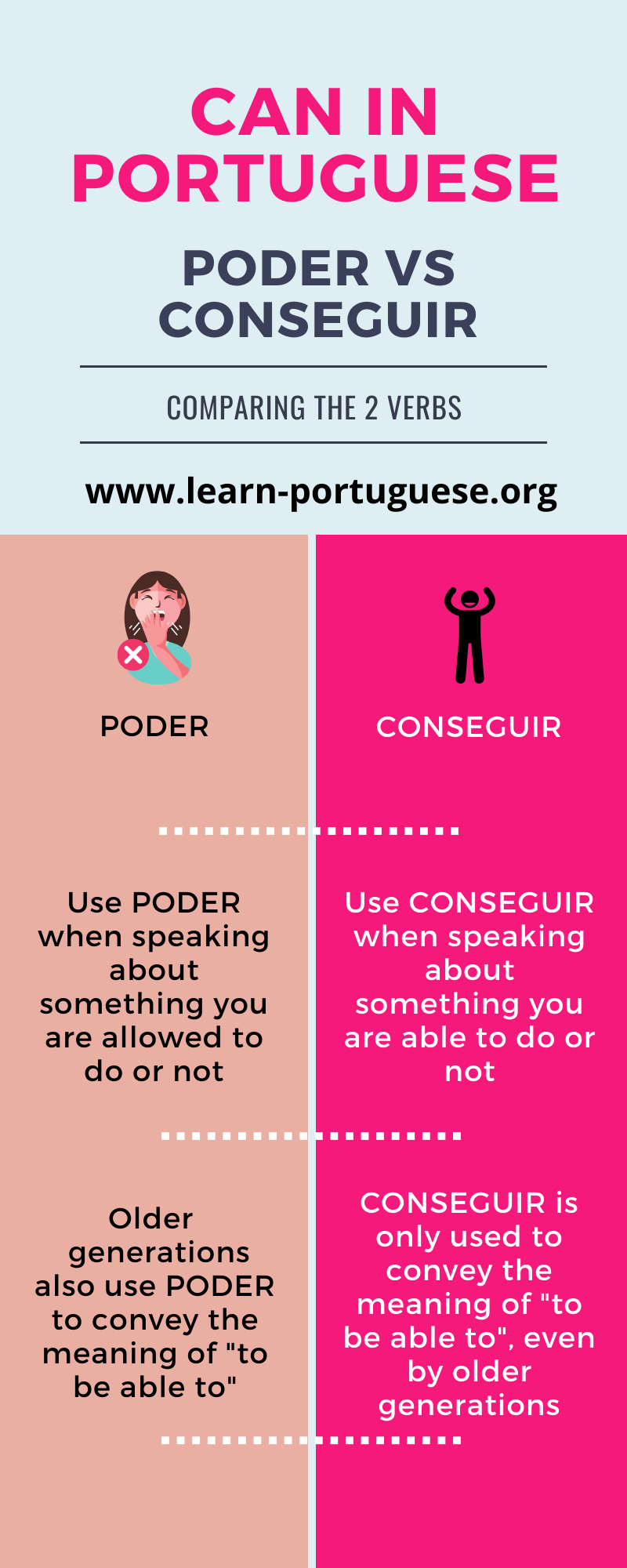
The verbs Poder vs Conseguir in Portuguese
The conjugation of poder is highly irregular; it is a stem-changing verb, since the -o- in the stem often changes to -u- or -ue-, and the ending may also change. There are no other verbs that follow the same pattern.

Learn Spanish Verbs poder ⇔ to be able, can Simple Present Conjugation (English ⇔ Spanish Audio
An easy to use chart of all the conjugations of the Spanish verb Poder use it online, or your mobile device or go old school and print it out to use as a worksheet. This website uses cookies We use cookies to personalise content and ads, to provide social media features and to analyse our traffic.

Poder y Dormir conjugations YouTube
Poder is a Spanish irregular verb meaning can, to be able to. Poder appears on the 100 Most Used Spanish Verbs Poster as the 10th most used irregular verb.For the preterite tense conjugation, go to Poder Preterite Tense Conjugation.Poder Conjugation: Present Tense yo puedo tú puedes él/ella puede ns. podemos vs. podéis.
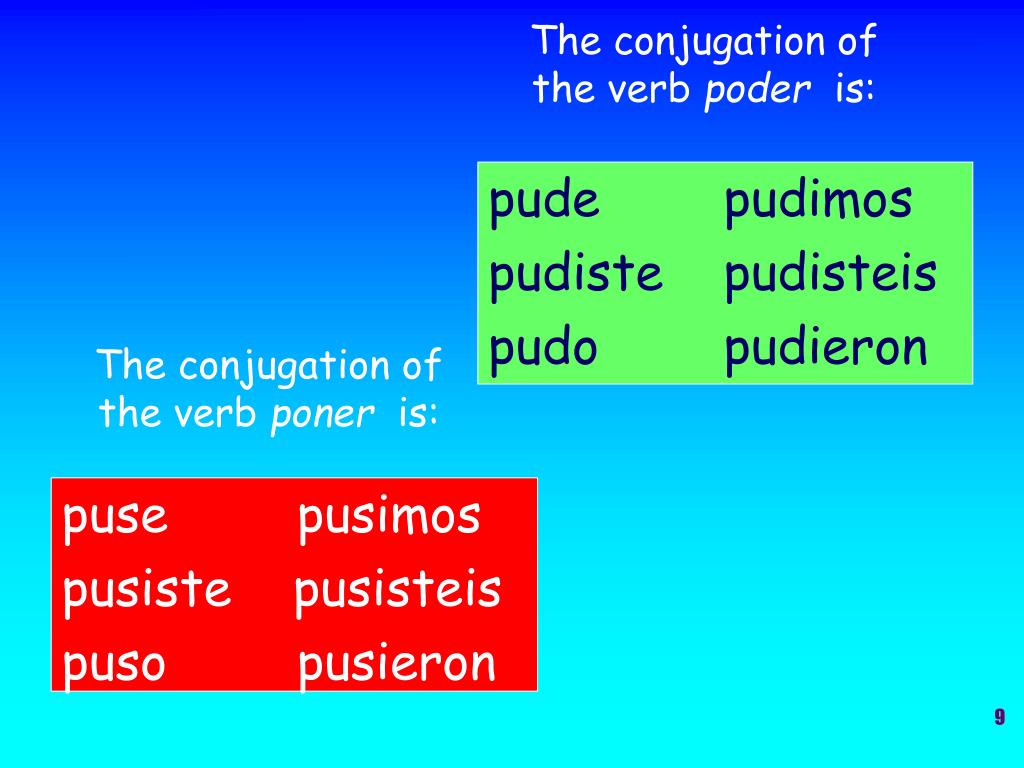
PPT IUJ Verbs in the Preterite PowerPoint Presentation, free download ID6746810
Conjugation of poder (can/to be able to) Spanish conjugations can seem intimidating. If you feel overwhelmed by the table below, I recommend the following: today, learn the first & second person present only (I can, you can). Tomorrow, come back and learn the first & second person in one of the past tenses. Then move on!
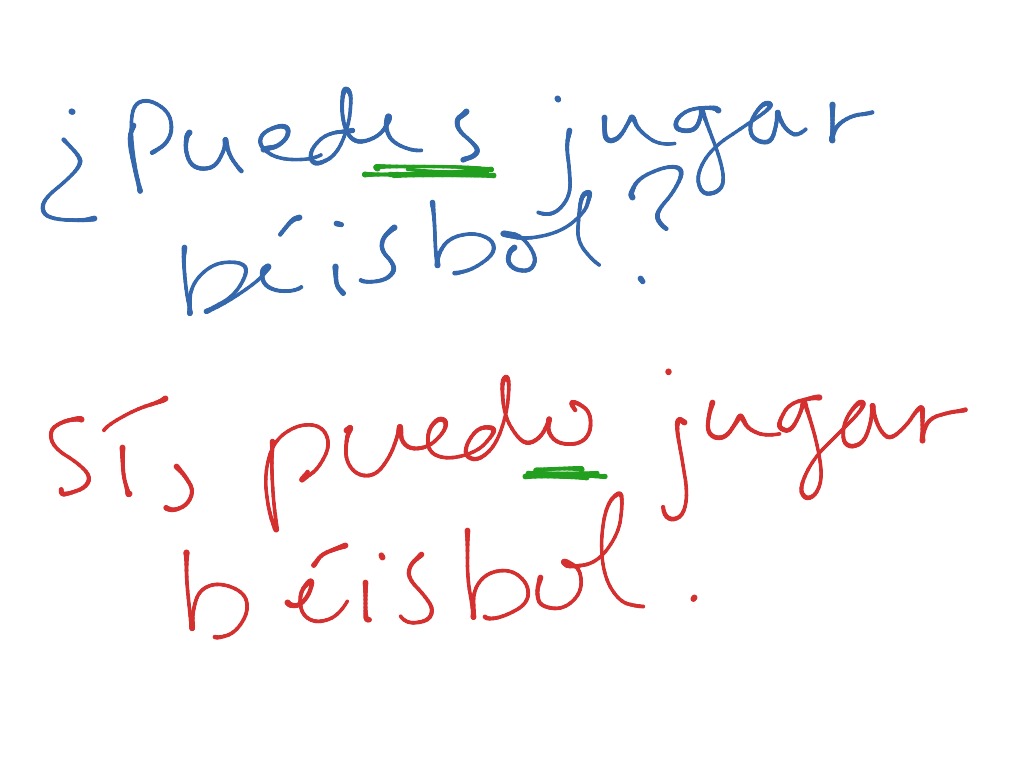
ShowMe verb conjugations
Conjugation Examples Pronunciation Thesaurus RELATED ARTICLES Expressions with "Poder" poder ( poh - dehr ) auxiliary verb 1. (used to indicate capability) a. can Mi novia puede bailar salsa. My girlfriend can dance the salsa. b. to be able to Necesito mis gafas para poder ver.I need my glasses to be able to see.

Poder future tense Learning spanish, Spanish verbs, Imperfect tense spanish
Overview of Poder Irregularities: Preterite: pud for all subject pronouns. Future & Conditional: podr for all subject pronouns. Imperfect Subjunctive: pudie for all subject pronouns. Stem Changes: O to UE Present Indicative: pued for all subject pronouns except 'nosotros' and 'vosotros'.

Spanish SUPER 7 and Super 16 PROJECTABLE Verb Questions POWERPOINT Verb Chart How to speak
poder to be able, "can" Present Subjunctive / Presente de Subjuntivo tú puedas él / Ud. pueda vosotros podáis ellos / Uds. puedan Color Key Other Tenses / Moods of Poder Simple Tenses Present Tense Imperfect Tense Preterite (Past Tense) Future Tense Conditional Tense Subjunctive Tense Imperfect Subjunctive Future Subjunctive Imperative (Command)

Spanish 2 Lesson 3A7 (3.1.7) Irregular Preterites TENER HACER ESTAR PODER YouTube
Poder is an irregular Spanish verb. This is because, for some conjugations, its main stem ( pod-) changes to other stems like pued-, podr-, and pud-. The stem change occurs depending on the tense.

Find and Circle Spanish Verbs Worksheet Highfrequency verbs Spanish verbs, Substitute
Poder is a common Spanish verb that translates to "can" or "to be able to.". In any language, people often talk about things that they can or cannot do, from asking or giving permission to discussing skills and abilities (or lack thereof). Poder conjugation is irregular. It is a stem-changing verb, in which the - o- in the stem often.